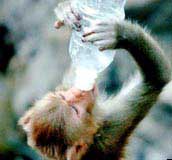Brown monkeys tend to drink more alcohol when they are home alone, and some even enjoy ending a hard day with a few cocktails.
 |
|
Image: Discovery |
The behavior of these monkeys closely mirrors human patterns. Researchers suggest that the reasons for alcohol consumption in both humans and monkeys stem from genetics and environmental factors.
In the study, “the monkeys had blood alcohol levels exceeding the legal limit for humans in most U.S. states,” stated Scott Chen, a study author at the Animal Health Center in Maryland. The research also found that drinking behavior affects monkeys in a manner similar to humans.
“It’s not uncommon to see some monkeys stumbling and falling, swaying, and vomiting,” Chen said. “In some heavy drinkers, they drink until they fall asleep.”
In the initial experiment, 21 monkeys were allowed to share a sweet alcoholic beverage. Neck collars recorded the amount of alcohol consumed, and each monkey underwent blood testing. In a subsequent experiment, 10 monkeys drank in separate rooms.
“Those alone clearly drank more than those in groups, at least 2-3 times more. For those in groups, various factors influenced alcohol consumption, such as status or dominance,” Chen explained.
Overall, lower-ranking male monkeys tended to drink more, although some consistently drank heavily regardless of their rank or living situation.
“Similar to humans, brown monkeys have unique drinking preferences, with varying stress levels, tolerance, and other genetic factors leading to different alcohol consumption rates,” Chen clarified.
In another study, scientists allowed a group of male monkeys access to a barrel of alcohol for 24 hours. The results showed a spike in alcohol consumption after laboratory work hours.
“Like humans, monkeys tend to drink more after stressful periods, such as after eight hours of testing each day and following a long week of experiments,” Chen noted.
Judy Cameron, a professor at Oregon Health Sciences University, stated: “The fact that different animals consume varying amounts of alcohol indicates that the nervous systems in their brains control alcohol consumption differently, just like in humans.”
As monkeys also undergo withdrawal processes, Chen and his colleagues hope to discover medications to prevent addiction that could also be applicable to humans.


















































